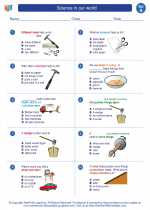What is Biotechnology?
Biotechnology is the use of living organisms or biological systems to develop or make useful products. It involves the manipulation of biological systems at the molecular and cellular level to create new technologies and products that benefit humans and the environment.
Applications of Biotechnology
Biotechnology has a wide range of applications, including:
- Agricultural biotechnology: This involves the use of biotechnology to improve crop yields, develop genetically modified organisms (GMOs), and enhance agricultural practices.
- Medical biotechnology: This field focuses on the development of new treatments, diagnostic tools, and medical devices using biological systems and techniques.
- Industrial biotechnology: It involves using biological systems to produce industrial products, such as biofuels, bioplastics, and enzymes for industrial processes.
- Environmental biotechnology: This area focuses on using biological systems to address environmental challenges, such as pollution remediation and waste management.
Study Guide for Biotechnology
If you're studying biotechnology, here are some key topics and concepts to focus on:
- Genetic Engineering: Understand the principles of genetic modification and the techniques used to manipulate the genetic material of organisms.
- Biopharmaceuticals: Learn about the development and production of pharmaceutical drugs using biotechnological methods.
- Cell Culture: Explore the techniques and applications of growing and maintaining cells in a laboratory setting.
- Bioremediation: Understand how biological processes can be used to clean up pollutants in the environment.
- Ethical and Social Implications: Consider the ethical and societal issues related to the use of biotechnology, such as genetically modified organisms and gene editing.
Studying biotechnology can provide insights into the ways in which living organisms and biological systems can be harnessed for the benefit of humanity and the environment.
[Biotechnology] Related Worksheets and Study Guides:
.◂Science Worksheets and Study Guides First Grade. Science in our world
Study Guide Science in our world
Science in our world  Worksheet/Answer key
Worksheet/Answer key Science in our world
Science in our world  Worksheet/Answer key
Worksheet/Answer key Science in our world
Science in our world  Worksheet/Answer key
Worksheet/Answer key Science in our world
Science in our world  Vocabulary/Answer key
Vocabulary/Answer key Science in our world
Science in our world  Vocabulary/Answer key
Vocabulary/Answer key Science in our world
Science in our world 

 Worksheet/Answer key
Worksheet/Answer key
 Worksheet/Answer key
Worksheet/Answer key
 Worksheet/Answer key
Worksheet/Answer key
 Vocabulary/Answer key
Vocabulary/Answer key
 Vocabulary/Answer key
Vocabulary/Answer key

The resources above cover the following skills:
PHYSICAL SCIENCE (NGSS)
Waves and their Applications in Technologies for Information Transfer
Students who demonstrate understanding can:
Use tools and materials to design and build a device that uses light or sound to solve the problem of communicating over a distance.